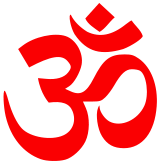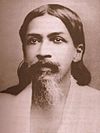
Portal:Hinduism
|
edit
The Hinduism PortalHinduism (Sanskrit Hindū Dharma—हिन्दू धर्म, also known as Sanātana Dharma सनातन धर्म, and Vaidika Dharma वैदिक धर्म) is a religion originating in the Indian subcontinent, based on the Vedas, and is thought to be the oldest religious tradition still practiced today. The term, "Hinduism," is heterogeneous, as Hinduism consists of several schools of thought. It encompasses many religious rituals that widely vary in practice, as well as many diverse philosophies. Most Hindus believe in a Supreme Cosmic Spirit, which may be understood in abstract terms as Brahman or which may be worshipped in personal forms such as Vishnu, Shiva or Shakti. The religion is classified by many different forms of theism such as monotheism, monism, pantheism, polytheism and even atheism. Hinduism is the third largest religion in the world with approximately 1 Billion adherents, (2010), approximately 930 million of whom are in India. edit
Selected article
Karma is a concept in Hinduism which explains causality through a system where beneficial effects are derived from past beneficial actions and harmful effects from past harmful actions, creating a system of actions and reactions throughout a person's reincarnated lives. Karma in Hinduism explains the problem of evil that persists in spite of an omniscient, omnipotent, benevolent God; it is thus related to theodicy.
Karma is a sum of all that an individual has done, is currently doing and will do. The results or "fruits" of actions are called karma-phala. Karma is not about retribution, vengeance, punishment or reward. Karma simply deals with what is. The effects of all deeds actively create past, present and future experiences, thus making one responsible for one's own life, and the pain and joy it brings to others. In religions that incorporate reincarnation, karma extends through one's present life and all past and future lives as well. The "Law of Karma" is central to Hinduism. All living creatures are responsible for their karma. Their actions and the effects of their actions and for their release from samsara. The concept can be traced back to the early Upanishads. edit
Selected picture
edit
Selected biography
Sri Aurobindo (Bengali: শ্রী অরবিন্দ; August 15, 1872–December 5, 1950) was an Indian nationalist, scholar, poet, Hindu mystic, evolutionary philosopher, yogi and guru. His followers further believe that he was an avatar, an incarnation of the supreme being.
Sri Aurobindo spent his life—through his vast writings and through his own development—working for the freedom of India, the path to the further evolution of life on earth, and to bring down what he called the Supramental Truth Consciousness Force to enable such progress. Aurobindo rejected the materialistic tendencies of both Darwinism and Samkhya, and proposed an evolution of spirit rather than matter. edit
Did you know...
edit
Festivals
edit
Selected quote
I must confess to you that when doubt haunts me, when disappointments stare me in the face, and when I see not one ray of light on the horizon, I turn to the Bhagavad Gita and find a verse to comfort me; and I immediately begin to smile in the midst of overwhelming sorrow.
— Mahatma Gandhi (1869-1948)
|







